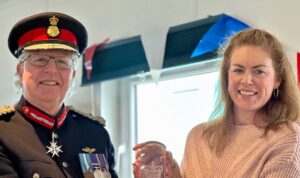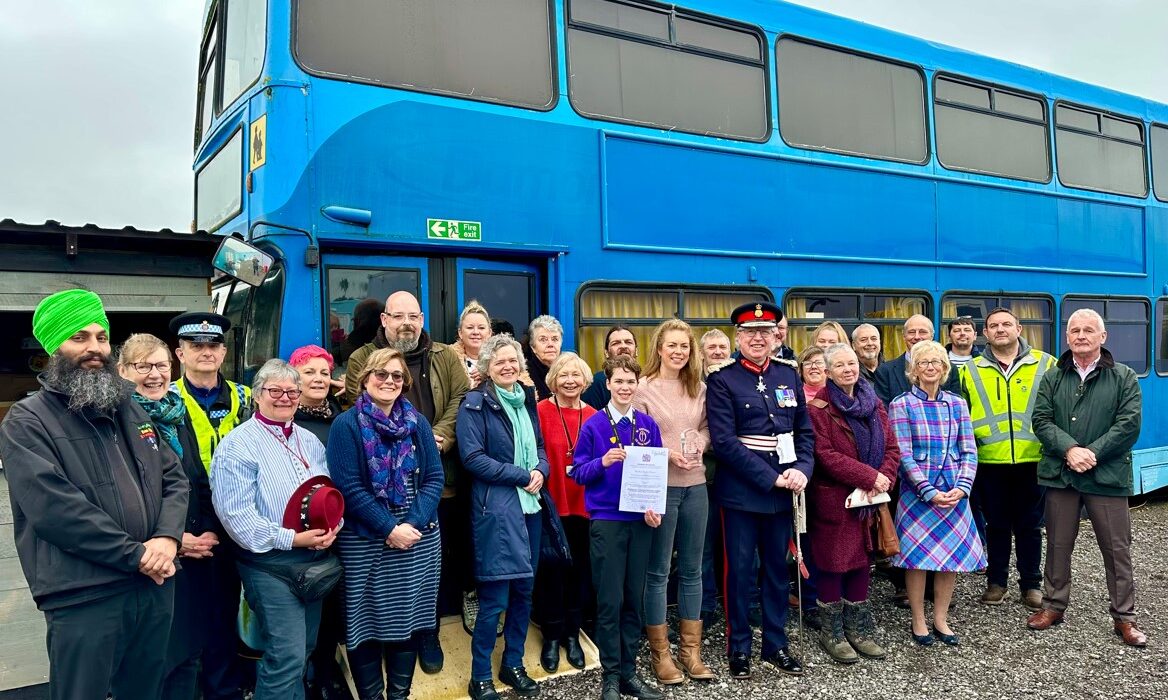“We become the family they haven’t got,” says Emily McCarron, 42, who has turned the spark of an idea to help rough sleepers into a community of support for people who have fallen through the cracks.
Emily and Eddie – both experienced rough sleeper support workers – toiled day and night to get The Bus Shelter Dorset established after being inspired to convert a double decker bus to house the homeless in Weymouth and the surrounding area.
Now they have been awarded the Queen’s Award for Voluntary Service, after seeing their project go from a bus with no running water and no electric to an impressive community of private rooms in just six years.
The project was born in 2016, after they learned about a bus on the Isle of Wight that had been converted to house rough sleepers.
Emily said: “We went and visited and I thought, that’s it!
“That’s what we’re going to do.”

In March 2017 they won charitable status, with a few trustees and a bus donated by Damory Coaches. They then recruited volunteers to help support the bus – one man took four months off work to convert it, installing beds with USB points and lights and creating a living area with woodburner downstairs. With lots of people pulling together over the summer and with help from the then Weymouth and Portland District Council, they were able to open the bus to rough sleepers in January 2018.
“It’s great we got the support we did,” says Emily. “When we opened there was just the bus and a Portaloo and a burger van, parked at Lodmoor. We had no running water, no electricity – it was a bit like camping, but worse…
“We housed up to 13 people in the bus and it could get pretty hot in summer. But we all pulled together. In a couple of months we were 24/7 and that was a lot of hours for volunteers. Though it was really hard, we created a community.”
Thankfully, they were awarded funding for some permanent staff and that funding has been increased to pay for a full-time team. Money has come from Dorset Council, the Lottery, Lloyds Bank, the Tudor Trust and Public Health England, and the team have won various smaller pots of money, as well as receiving countless donations of food, bedding and other essentials from the public and some supermarkets.
It’s been anything but plain sailing, with the team having to move four times in 18 months. During the first lockdown, they were moved to rooms at the back of the Riviera Hotel, while the council moved other rough sleepers into rooms at the front. It was a difficult time, but Emily and her team kept up the support for the residents they were responsible for and eventually they were allowed to move into the youth hostel in Swanage, before moving into a council property, then to their current home at Weymouth’s Park and Ride. The bus is still there, but has become a storage facility and meeting space.
Now they have 12 private ‘micro-flats’ in what looks like shipping containers, with their own showers and toilets, plus a large shared kitchen and lounge. Residents can sit outside and enjoy their meals – one of the residents cooks for the rest every evening. They aren’t allowed drink or drugs there. The charity has recently won planning permission for five more ‘micro-flats’, and now need to raise £200,000 to buy them.
“What we do here creates really amazing relationships,” said Emily. “It’s a bit of a family here, where people are supported fully with the hope they never have to come back here in the future.”
The support they receive is holistic in nature, from a prescriber who visits to look after their medical needs to visits to their allotment at Chickerell’s Tumbledown Farm.
There is support for drug and alcohol issues, and with mental health.
The team work with many other agencies, including police and the probation service, to make it as easy as it can be for rough sleepers with multiple issues to overcome challenges large and small.
Emily said: “Covid forced us to do that better, which is great.
“Staff work incredibly hard for our clients. We try to be the best support and advocate for them, to be their voice sometimes, and speak up for them.”
Residents can stay for as long as it takes – one has been here for three years, another has moved on after just a few weeks.
The team have spawned a ‘Next Step’ operation, where they find accommodation where residents can live with a little less support – they are visited twice weekly so that staff can check on them and the accommodation, and they offer rent guarantees, insurance and close monitoring to ensure accommodation is maintained.
n They are always looking to work with local landlords and take on new properties – anyone who would like to know more can email jemmalonstbsd@gmail.com




